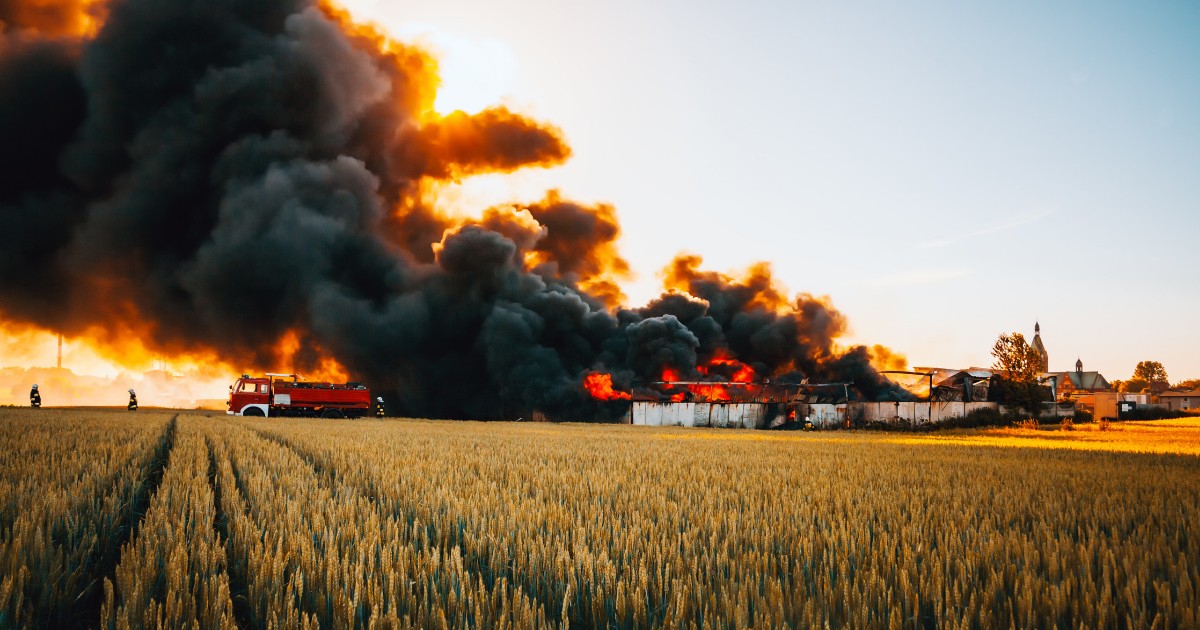Farm fires are inevitable and a nightmare for farmers. One single spark can start a wildfire and damage your important farm or maybe newly bought John Deere 5310 or Mahindra 475 other important machinery.
The farm fire can cause loss of crops and even life if not controlled on time. Summer fires in farms can occur out of an electrical storm or due to the burning of hot hay. At the same time, winter fires can result from faulty wire appliances.
No matter what’s the cause, farm fires are dangerous. Let’s look at a few tips on preventing the farm fire and what to do in case you encounter it.
Top Tips on How You Can Prevent Farm Fires
- Identify ignition sources & keep them away
Ignition sources can be any material around your farm that can accelerate fire in flammable objects like hay. A few of the things like flammable chemicals, electrical appliances, motors, cigarettes, matchboxes, batteries, and heaters should be kept away from the field.
- Install fire extinguishers
Installing fire extinguishers or buckets of sand around the machine sheds, vehicles, tractors, and workshops. Keeping them around other areas that are tolerant to combustion can help timely act on fire breaking out.
- Clean your area
Remove old and rotting furniture, fence, wood, old bags, paper and other trash items that can catch fire. Keep weathered surfaces painted if possible. Have frequent cleaning or decluttering around the farm field.
- Don’t park vehicles in tall vegetation
While rummaging through the field, don’t park your vehicles around tall plants or vegetation. A high heat radiating out of the exhaust can spark a fire in the grass and start a wildfire.
- Have your electrical wiring/system inspected
A faulty circuit or malfunctioned electrical system can spark a fire. Do you know gases generated by livestock or manure and the humidity can cause electrical systems to degrade?
Make sure you get your electrical system as appliances; their wirings or entry points inspected frequently. And if you have rodents that can chew the wires, use snap traps or ammonia spray around the field to keep them away.
- Don’t store wet hay
While storing the hay, make sure they are not wet. And ensure the area you are storing them in is highly ventilated. For a fact, highly moistured grass, which is baled above 24%, can cause sudden combustion.
And overheated hay can gradually burn the hay barn, so be cautious! Avoid baling at 25% -30% moisture. Even if the heated hays don’t cause fire, the overheating can cook out the important nutrients and carbohydrates from them and become indigestible for livestock.
- Install smoke detectors in livestock buildings
Install effective heat and smoke detectors in the confinement where livestock are put. There are several quality smoke detectors available that you can install. Make sure the ones you are installing are loud and ring whenever a tinge of smoke or fire graduates.
- Have the fire department’s number handy
Make sure you have the fire department’s number handy with you. Keep it near the telephone or create a directory of important numbers. You can list another number in that directory other than fire departments, like the technician’s number, healthcare hotline or other services that you frequently avail.
- Be prepared, sit down and plan
Nobody wishes to anticipate such events as they are highly uncalled. But it’s best if you stay prepared and plan how you would go about it in case this day arrives.
Have a plan about what do’s and don’ts you will follow during such a course of the event. List down things that can break down fire, regularly keep them away, and put them after use in the right place.
Keep buildings and areas where livestock are kept squeaky clean. Regularly check for the electrical system. If you sense something, immediately have it checked. Make a list of things you would need to take along if a fire breaks down the farm field; it can include anything your important documents or machinery.
Make sure you are being careful while burning the field. Check with your local fire department, and take training on what precautions are necessary to take into account. They can guide you well with how to approach fire hazards. They can help you map out a complete plan of action about how to evacuate the place and what precautions to take ahead.
How to Prevent Fire from Lightening?
Sure thing lightning is unpredictable and cannot be avoided, but you can avoid its heavy impacts with a few smart ways.
- Ensure all electrical, telephone lines, or water systems are grounded.
- Install lightning rods made of aluminium or copper in the building, which should be grounded.
- Refer qualified technicians to help with proper installation and fitting.
What to do In case a fire occurs?
If there is just smoke and a tinge of heat emerging out, you can handle it with fire extinguishers and sand buckets.
But if you feel the fire breaking out is bad, contact the fire department, do not attempt to extinguish the fire on your own. Empty the confinement or premises. Take out all the livestock and people over the field. Take all the important belongings along with you and wait for the fire department to arrive and act.









































